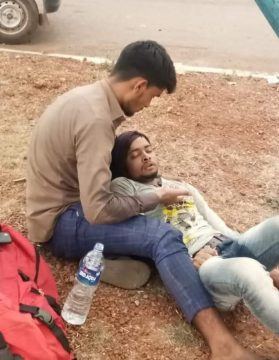Basharat Peer in The New York Times:
 DEVARI, India — Somebody took a photograph on the side of a highway in India. On a clearing of baked earth, a lithe, athletic man holds his friend in his lap. A red bag and a half empty bottle of water are at his side. The first man is leaning over his friend like a canopy, his face is anxious and his eyes searching his friend’s face for signs of life. The man is small and wiry, in a light green T-shirt and a faded pair of jeans. He is sick, and seems barely conscious. His hair is soaked and sticking to his scalp, a sparse stubble lines the deathlike pallor of his face, his eyes are closed, and his darkened lips are half parted. The lid of the water bottle is open. His friend’s cupped hand is about to pour some water on his feverish, dehydrated lips.
DEVARI, India — Somebody took a photograph on the side of a highway in India. On a clearing of baked earth, a lithe, athletic man holds his friend in his lap. A red bag and a half empty bottle of water are at his side. The first man is leaning over his friend like a canopy, his face is anxious and his eyes searching his friend’s face for signs of life. The man is small and wiry, in a light green T-shirt and a faded pair of jeans. He is sick, and seems barely conscious. His hair is soaked and sticking to his scalp, a sparse stubble lines the deathlike pallor of his face, his eyes are closed, and his darkened lips are half parted. The lid of the water bottle is open. His friend’s cupped hand is about to pour some water on his feverish, dehydrated lips.
I saw this photo in May, as it was traveling across Indian social media. News stories filled in some of the details: It was taken on May 15 on the outskirts of Kolaras, a small town in the central Indian state of Madhya Pradesh. The two young men were childhood friends: Mohammad Saiyub, a 22-year-old Muslim, and Amrit Kumar, a 24-year-old Dalit, which refers to former “untouchables,” who have suffered the greatest violence and discrimination under the centuries-old Hindu caste system. Over the next few weeks, I found myself returning to that moment preserved and isolated by the photograph. I came across some details about their lives in the Indian press: The boys came from a small village called Devari in the northern Indian state of Uttar Pradesh. They had been working in Surat, a city on the west coast, and were making their way home, part of a mass migration that began when the Indian government ordered a national lockdown to prevent the spread of the coronavirus. Despite our image-saturated times, the photograph began assuming greater meanings for me.
For the past six years, since Prime Minister Narendra Modi and his Hindu nationalist Bharatiya Janata Party took power, it has seemed as if a veil covering India’s basest impulses has been removed. The ideas of civility, grace and tolerance were replaced by triumphalist displays of prejudice, sexism, hate speech and abuse directed at women, minorities and liberals. This culture of vilification dominates India’s television networks, social media and the immensely popular mobile messaging service WhatsApp. When you do come across acts of kindness and compassion, they seem to be documented and calibrated to serve the gods of exhibitionism and self-promotion. The photograph of Amrit and Saiyub came like a gentle rain from heaven on India’s hate-filled public sphere. The gift of friendship and trust it captured filled me with a certain sadness, as it felt so rare. I felt compelled to find out more about their lives and journeys.
More here.
